
All tea contains caffeine as its naturally present in Camellia sinensis – the tea plant

Herbal 'teas' like this Peppermint do not contain caffeine as they aren't made for the tea plant
Caffeine in Tea - When I started getting into tea a few years ago, caffeine was never a huge concern for me. I knew the tea I was drinking had some caffeine in it, but at the time I was more excited about discovering the flavours and new tastes of teas and exploring the places and cultures they came from. However, it was inevitable after a time that I wanted to know more about science behind the leaves – why do certain origins or cultivars produce certain tastes, and so eventually the question of caffeine began to fill my mind; was it having any impact on what I was tasting, on me and how much was I really consuming?
A quick internet search for the phrase ‘How much caffeine in tea?’ brought up a lot of contradictory information. . Some said green tea had more caffeine, others said it was black tea that had the most, while some even said white had no caffeine at all, but how could this be? Confused by it all, I’ve been diving into, the research JING and Oxford Brookes University did a few years ago to get some answers..
Here’s what I found and my guide to demystifying what’s going on with the caffeine in our tea leaves
What Do We Already Know?
Let’s start by looking at the basic facts and what we already know for certain:
- All tea contains caffeine. If it’s called ‘tea’ then it must be made using the buds and leaves of the camellia sinensis plant, which contains naturally occurring caffeine, as well as many other plant compounds.
- Caffeine’s job is to act as a natural pesticide. By producing caffeine, the tender leaves and juicy buds taste bitter and so and potential insect or bird attackers are deterred from eating them
- Products labelled ‘herbal teas’ or ‘tisanes’ unless they are mixed with tea leaves, do not contain any caffeine at all. These are things like Peppermint, Chamomile or Lemongrass & Ginger, which are made from other flowers, fruits, herbs and spices.
How Does Caffeine Work?
Most often we hear of caffeine as a stimulant and if you’ve ever had too much coffee in one go then you’ll know how stimulating it can be, but how does it work? Well, it acts as a psychoactive, receptor antagonist in our central nervous system. That’s a fancy way of saying it interrupts and replaces other signals that are flowing through the body. The main one it interrupts is a neurotransmitter called, adenosine, which is which acts like a brake, naturally slowing us down and promoting sleep. As the caffeine molecules block the adenosine from getting to its receptors they allow for a boost to brain activity, speeding us up, while causing a release of adrenaline and ultimately making us feel more alert.
What caffeine doesn’t do is stop the production of adenosine, and so once the caffeine has worn off and the receptors are free again, a backlog of adenosine floods them and that’s what can cause a sudden crash of sleepiness – what you might have experienced as a coffee come down!
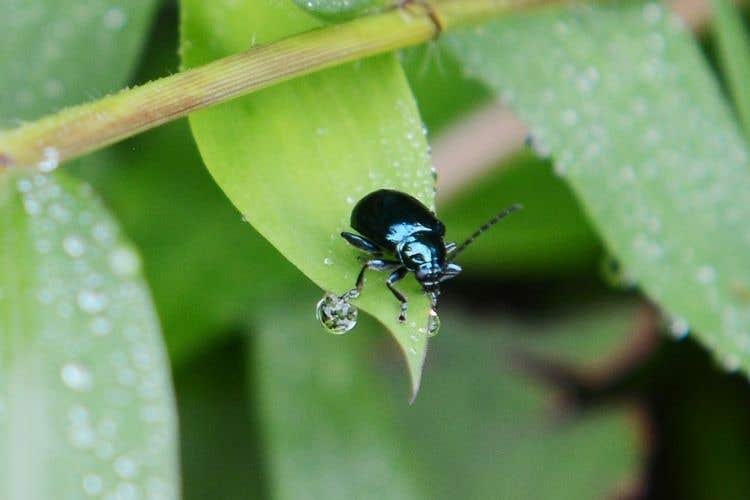
Caffeine acts as a natural deterrent againsts tea garden pests
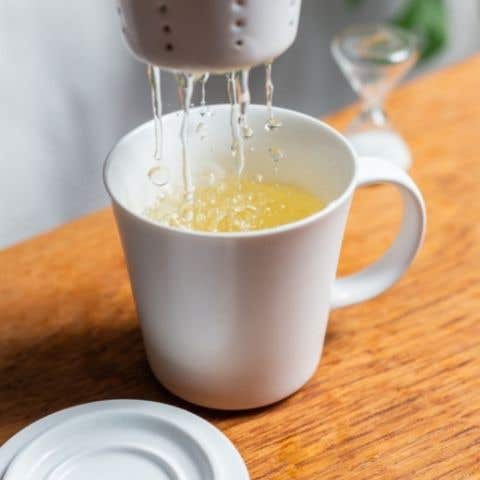
Caffeine can be stimulating and make us feel more alert
So Why No Come Down from Tea?
Partly it’s because there’s much less caffeine in tea than in coffee but also, and perhaps more interestingly it’s because Camellia sinensis leaves also contain the amino acid 'L-theanine'. This works in conjunction with caffeine to uplift and relax the body and has the effect of slowing the absorption of caffeine, rewarding you with a more sustained feeling of alertness without the sudden crash.
How Much is Too Much?
The recommended maximum daily intake of caffeine is 400mg, or 200mg for pregnant women (NHS recommendation 2022). Drinking up to 400mg of caffeine a day isn’t believed to pose any health risks for normal, healthy individuals. This is quite a lot of caffeine too - to exceed the recommended daily intake, you would need to drink 8 cups or more of tea a day!
I’ve heard caffeine is a diuretic – is that true?
While research into all the effects of caffeine consumption on health is ongoing, When consumed within the recommended daily intake, tea has been found to be hydrating; at this level of consumption, there is not enough in tea to cause a diuretic effect.
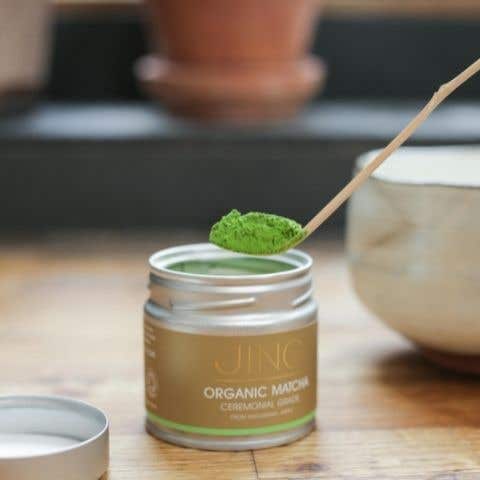
Matcha drinks contain more caffeine as you consume the whole, powdered tea leaf
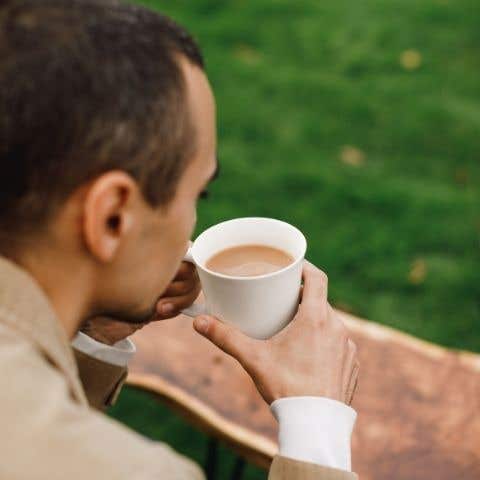
For a strong breakfast tea with low caffeine try decaffeinated teas
So what about the different tea types?
Now we know what caffeine does and why it exists in the tea plant let’s have a look at some of the data that was revealed from our research. We had lots of teas of various tea types analysed for their caffeine content in milligrams per 150ml infusion and here is what we found:

As you can see, there is a consistent range of between 25-46mg, with even small variations inside the tea types.. However, if we look at the Silver Needle and White Peony white teas, they have almost as much caffeine as our Yunnan Gold which is a black tea. All this is to say that tea type does not dictate caffeine content and relatively speaking most teas will fall within this range.
In investigating the different ranges of tea, we also came to understand that these levels can vary quite dramatically from season to season, and crop to crop, even within the same tea. So it’s important to understand that these levels are indicative, but not absolute, serving as a guide and comparison in your beverages. In fact, to put it all in context, here is a general comparison of the caffeine content found in other drinks:

An exception to the rule – Matcha
Matcha is a stone-ground green tea. Once it is ground, the powder is whisked and suspended in water. This means the tea leaves are ingested – unlike in a regular infusion – so matcha teas contain significantly higher concentrations of caffeine and antioxidants.
Are there any ways to control how much caffeine I get in my cup?
Caffeine is extracted from tea with heat and time. Although as we’ve seen above, there is little variation in the amount of caffeine contained in different types of tea, in practice they can deliver varying amounts of caffeine to the drinker. For example, a tea infused with 100˚C water for three minutes (the recommended way to prepare black tea) will deliver more caffeine than the same tea infused for the same amount of time with 80˚C water (the recommended way to prepare green tea).
Hopefully, the moderate level of caffeine presented in tea shouldn’t be too large a concern. However, if cutting your consumption is something you would like to do then the main ways would be to using a little less leaf and a lower temperature. Less leaves will obviously result in less caffeine, while using cooler temperatures like 80˚C, which is standard for getting the best flavours from most green teas, will reduce how quickly caffeine is extracted in your infusion and as a bonus for green and white teas, bring out more of the sweeter notes from the tea.
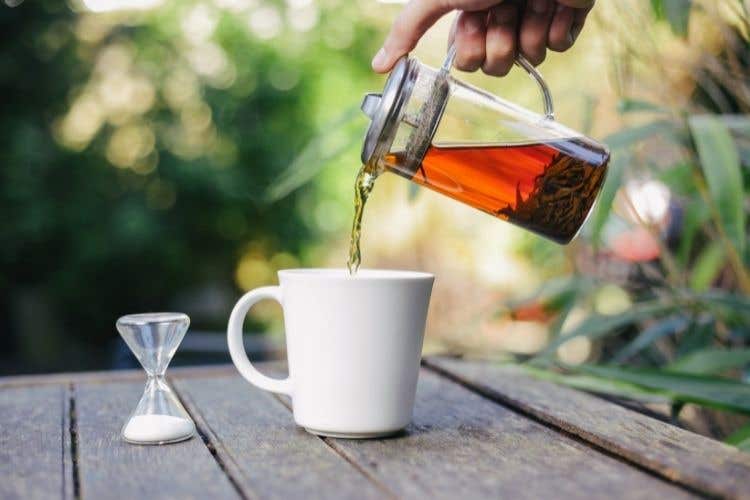
Most tea infusions will contain half the amount of caffeine of a cup of coffee. jpg
It’s also worth noting that most of the caffeine is likely to be extracted in the first infusion, so you could perhaps infuse your leaves for a minute, discard the liquid and re-infuse them for the full 3 minutes for a lower level.
These ways of making will have an effect on the taste of your tea though – if you love full flavoured, robust black tea or want to add milk to your breakfast tea, we’d never recommend using 80 degree water as it’ll taste weak and insipid. If this sounds like you, we’d recommend instead trying our decaffeinated Ceylon black tea, which contains only minimal amounts of caffeine. Or, herbal infusions which are completely caffeine free and still full of flavour.
As with anything with regards to health, if you’re unsure and still concerned, we suggest you discuss any matters related to your diet with your doctor.

